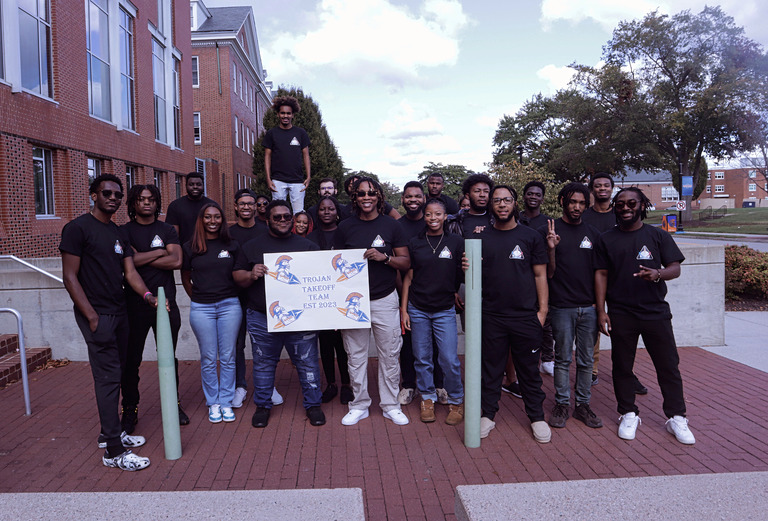Courtesy of Virginia State University
For the first time in the history of Virginia State University, a team of students has been invited to participate in the 2023-2024 NASA Student Launch Challenge. The Trojan Takeoff Team will compete against 48 teams from universities nationwide in one of the most prestigious rocketry competitions in the country. Teams are expected to design, build, and launch a high-powered rocket to an altitude of 4,000 to 5,000 feet. The event will take place in Huntsville, Alabama, in April 2024.
“The NASA Student Launch Competition is a nationwide competition among colleges and universities, and NASA only selects the best for this type of competition,” said associate professor of Computer Engineering and team advisor Christopher Washington. “Additionally, a rocket launch competition is a new area for our students. The “Trojan Takeoff Team” selection for the NASA Student Launch Competition is a significant feather in the cap of the College of Engineering and Technology.”
The Trojan Takeoff Team consists of 31 students. Most of the members are engineering or computer science majors, but anyone with an interest in rocketry can join, says team founder and VSU senior MaKhaila Bentil.
Bentil became interested in aerospace engineering after she was named the student leader for the university’s NASA H2O program, which allows minority students to connect and network with NASA personnel. This inspired her to form the Trojan Takeoff Team so she and her classmates could apply their coursework and also showcase the Greater Happenings within VSU’s engineering department.
“The idea of creating the Trojan Takeoff Team was to provide students with a hands-on opportunity to really apply themselves and the information and concepts they were being taught in the classroom,” said Bentil. “So, I thought, ‘Why not build a rocket launch team?’ There are tons of other reputable engineering institutions that participate, and I didn’t see why VSU couldn’t be one of them. We have amazing students and faculty who deserve to be recognized.”
As far as what is next for the Trojan Takeoff Team, they have designed a 3D model of their rocket and plan to have it fully built in the months leading up to NASA’s competition. In the meantime, they will receive training in rocket launching from a member of the National Association of Rocketry at VSU’s Randolph Farm, starting Saturday, November 4 at 11 a.m. For every team member, this will be their first exposure to rocket launching and will mark an important milestone of how far they have come.
“I’m tremendously proud of everything we’ve accomplished so far,” Bentil said. “The progress we’ve made has been outstanding, and our goal is to represent VSU to the best of our ability next April and hopefully inspire more Trojans to test the boundaries in the world of engineering. The sky really is the limit.”

